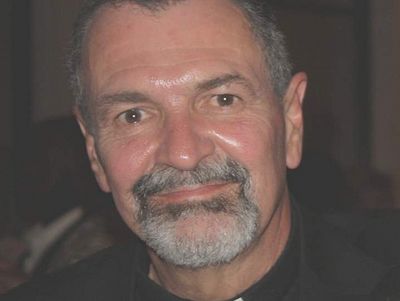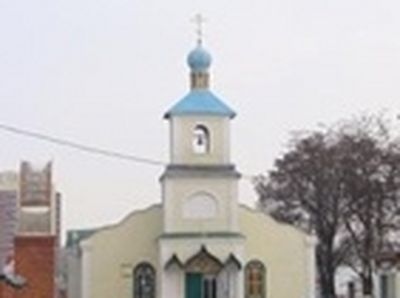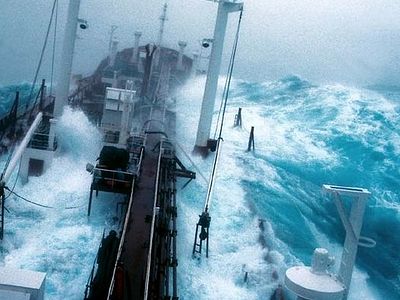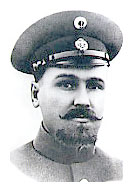 Валериан Альбанов
Валериан Альбанов
|
| Valerian Albanov |
In the summer of 1912 an expedition of 24 set off for the Arctic on board the good(s) ship "Saint Anna". The expedition was led by the Navy officer Georgy Lvovich Brusilov, and the crew included a woman - Erminia Alexandrovna Zhdanko, a ship nurse. Brusilov planned to take a northern route from St. Petersburg to Vladivostok, walrus hunting along the way. However, by October the ship was ice-bound by Yamal’s shores and started drifting North. It is well known, that only two members of the crew returned to the mainland in the end – the navigating officer Valerian Albanov and sailor Alexander Konrad. The rest of the expedition and the ship disappeared without a trace.
The heroic achievement of the navigator Albanov who crossed the distance of approximately 420 km, walking on drifting ice to Franz-Josef land, added a glorious page to the history of Russian polar research. This journey had a great scientific significance, and the story itself was well covered in specialized and popular scientific literature of the Soviet period. A famous Russian writer Veniamin Kaverin created the character of navigator Klimov in his novel «Two Captains» with Albanov as his prototype. However the heroic exploits of the navigator is not only the result of his personal courage, but also another evidence of St. Nicholas’ help to «those at sea and travelling». Let’s turn to our hero’s journal, which was published later, headed «To Franz-Josef Land» (the diary of navigating officer Valerian Albanov).
When at the beginning of 1914 it became clear that the expedition had to spend another winter at sea, it was decided that Albanov was to leave the ship with some other crewmembers. Food was getting scarce and with the departure of some of the crew those who were left at the ship could hope to hold on till October 1915. Besides, due to the discord which aroused between the head of the expedition Brusilov and Albanov the navigator was, following his own request, relieved of his duties. The moral climate at the ship and other circumstances – lack of fuel, sickness, fear of the future and so on, pushed the decision to send some of the crew towards the mainland. Another 14 people wished to join the navigator, and the preparations for the forthcoming march during those long winter months brought some diversity to the monotonous life of the expedition.
At last, everything was ready. The departure was scheduled for the evening of April 23rd. After the farewell dinner Albanov went to his cabin to mark the place of their set-off on a map and get his personal items. «Besides the underwear I was wearing I took two more changes, having given away the rest of the dress and linen to those who were left behind: I wouldn’t need it any more. I took my last small possession and put it in my side pocket – it was a little icon of St. Nicholas the Miracle-worker. My cabin took on a cold empty look. Having looked at it one last time, I got out onto the ice».
Everyone came out to say good-bye to the travellers; «No one was left inside the ship. Finally, Georgy Lvovich (Brusilov) got out as well, and came up to the back of the kayak, ready to help me to carry it…I took off my hat and crossed myself…Everyone else did the same. Somebody shouted "hooray", all the others took up, leaning upon the carrying slings, and we quietly set out on our long journey». An escort followed with the party for a few days, then returned to the ship. By the evening of April 29, the travellers lost sight of the Saint Anna. On the tenth day of journey three of the crew decided to go back. Eleven that were left continued through deep snow and ice fields. They were hoping to use their kayaks to move forward and shoot seals on the way, but there were no unfrozen patches in the ice. At the beginning of May, when the snow got covered with crust which was reflecting light, everyone’s eyes started hurting. Ahead were mere ice-hummocks. Meanwhile they ran out of fuel, and had only dry biscuits with frozen butter left to eat. Their spirits flagged, the hope to reach the mainland was disappearing with every new day. According to Albanov, «Our journey seemed infinite and dismal, it seemed there never would be a warmer season, we would never reach breaks in the ice, water to travel on, which we were so anxious to see.» Everyone went to bed gloomy and quiet. And then something happened and breathed new life into the navigator.
«In the morning», - Albanov wrote in his diary, - «I woke up happy and excited under the impression of the dream I just had. I instantly shared my story with my companions, as something really happy, which was directly related to the success of our journey. And they were interested and listened to me attentively.»
«I could see as we all are walking on a field, the kind we walked yesterday, and as usual are hauling along our sledges. And then we see a big crowd of people ahead, talking animatedly, and they all seem to be waiting for somebody and look in the direction where we are going. None of us were surprised with each other’s appearance. As if it is a usual thing and the meeting is the most ordinary.»
«We come up to those people and ask them who they are waiting for and why they are talking so excitedly. They show us a thin old white haired man, who at that moment showed up from behind snow hammocks, and tell us he is a clairvoyant or soothsayer, whose prophecies always come true.»
« So I think that’s a good opportunity which I shouldn’t miss. I must ask the old man to foretell our future, whether we would reach the land. I come up to him and hold out my hand with my palm up, as they do with fortune-tellers, who by the lines of your hand can tell the future. Or, possibly, I stretched out my hands as they do when they ask for blessing, cupping one hand over the other. The white haired old man cast a cursory glance at my hands, and said comfortingly: "It’s all right, you will make it, and water is not too far away, and then." I didn’t hear the end of his words and woke up.»
«Under the impression of that dream my spirits soared, and there was no trace of yesterday’s grimness. I inspired my companions with my enthusiasm as well. I never doubted that the dream was prophetic, and that the old man- clairvoyant was St. Nicholas the Miracle Worker, whose icon I had in my pocket. And the people who I saw in my dream didn’t look at the clairvoyant with such reverence for nothing/without a reason. Of course, I was sick then, and my hallucinations the day before, when in a half-conscious state I had found myself on a quay in Baku, only confirmed it. But throughout the whole journey up to cape Flora I couldn’t get the dream with all its minute details out of my head. At particularly difficult moments in spite of myself I would think of the old man’s prophecy. My companions started believing in my dream as well, especially when the same evening, totally unexpectedly for us, we found ourselves by a big patch of water. There we killed several seals, which gave us meat and fat for fuel. We had some rest, were full-up and happy. Our spirits went down easily, but we didn’t need much for happiness either…»
Several days have passed, and the expedition was struggling again. On May 16 a member of the crew, sailor Baev, went for ice patrol and never came back. His search proved unsuccessful. Two of Albanov’s companions developed the scurvy, and the rations were running low. On top of everything, the weather spoiled and the travellers couldn’t pinpoint their location for 19 days.
The navigator wrote in his journal:
«Friday, June 5th
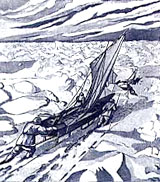 Drawing by V. Albanov
Drawing by V. Albanov
|
| Drawing by V. Albanov |
All around is still. We saw a bear’s track today, but it was old, probably from the time when this fresh ice was closer to the shore. We have six pounds of Skorikov’s bouillon so if we economise it would be enough to make twelve soups, which would be more like water than soup. Peas and "julienne" would make six very small portions of soup. There are three jars of milk left. I have handed out the rest of the chocolate at rest-break today. Now will have to replace it with condensed milk at noon, and then with dry apples, there are two pounds left…We don’t eat that little, but are hungry all the time. It’s true that mostly we eat dry biscuits, flavouring them with those dribs and drabs I mentioned earlier. All the time I can hear talk about most delicious and tempting food…
Is it possible that it is the end, is it the foreboding of our death? It cannot be true. I am sure that sooner or later we must reach the land. I can remember that dream too vividly, it made too profound an impression on me. During the journey I became religious the way I hadn’t been before. St. Nicholas icon is always in my pocket. The team’s spirits are very low, however hard I try to cheer them up».
St. Trinity day (Whitsunday) arrived, and turned out to be a real celebration for the travellers.
According to Albanov’s journal:
«Sunday, June 7 (evening)
Today is really St. Trinity day even for us, "at sea
and travelling". When the second stretch of water
came to an end, I crawled out onto the ice to measure the
midday height of the sun. After short calculations I got
the latitude 82° 21’. I couldn’t believe
my own calculations, but having double checked could see I
was right. Marvellous!
…Soon another kayak turned up and I told them my good news of the latitude. In reply they wished me a happy Trinity day and said they had killed a bear on the way. Isn’t it a lucky day for us. Last time we ate a bear at the ship last year, I think, in September, and since then could only dream about this game. And suddenly, when we had so little provisions left, and we have burned nearly everything for fuel, including a spare couple of oars and linen (though teeming with parasites), suddenly in this critical moment fate sends us a mountain of excellent meat…With the meat we got fuel as well, since the bear is so fat. Isn’t it strange that this unexpected valuable gift we got exactly when we needed it and on St. Trinity’s day? The Providence does want to strengthen us, lacking faith and weak. I can’t describe how uplifted we were by this present.»
Throughout June the travellers gradually moved towards South. The situation was complicated by the fact that Albanov didn’t have a good map, and couldn’t locate their exact whereabouts. The navigator’s greatest fear was the absence of the land in the direction where they were moving with the drifting ice. Besides, the ice was rearranging itself «every minute… as if some giants were playing with each other on an enormous chessboard». On one of the patrols «we were surprised to discover ski tracks on one of the ice-floes. Closer examination convinced us that we were looking at our own tracks, and that this ice floe had caught up with us as a result of a change of current. How is one supposed to proceed over this sort of ice? On the surface, once achieves no more success than a squirrel in a wheel-cage…» However, on June 22 the travellers saw the land/earth on the horizon. They managed to reach it with great difficulty by July 11. It turned out to be Alexandra land, cape Mary Harmsworth (Franz Josef Land). Here the travellers found a note which had been left by the English expedition of Jackson-Harmsworth in 1897. The note told them of their location.
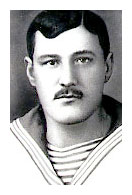 Александр Кондрат
Александр Кондрат
|
| Alexander Konrad |
Albanov made a decision to move towards cape Flora, where an English expedition had built a camp and where they could find lodging and food. They party split up: half of them went in kayaks, another half started walking on foot. But then even more challenging times arrived for the expedition. Albanov’s companions started falling dead with scurvy one by one. When there were only four left, they continued their journey in two kayaks. In the fog Albanov and Konrad lost sight of the second kayak. It became impossible to go further with the wind picking up, so Albanov and Konrad decided to have a break and spend the night on top of an iceberg, swathed in their malitsi (sailing clothes).
Their rest didn’t last long. The ice underneath them melted away and broke down, and the travellers found themselves in the water. The malitsi got frozen to each other and made up a bag quickly filling with water. It seemed the men were doomed. And then the navigator remembered his dream again: «My consciousness fought, protested against death, what about my dream? What was that prophecy for? It cannot be true! Believe me or not, but at that very moment my feet got on Konrad’s feet, we pushed each other out of the bag, and the next moment were standing wet on the underwater "sole" of the ice-berg, up to our chests in water. Around us there were our malitsi, shoes, hats, blankets, mittens and other objects floating in the water, we were catching them all and throwing them on the ice. … We were wearing only socks on our feet, and since we were standing on ice our legs went completely numb. While I was still standing in water, I was wondering in vain about what we were to do, we were going to freeze to death!
But the providence itself showed us what to do. As if in response to our question our kayak fell off the top of the iceberg into the water. It must have been blown away by the wind, or the ice underneath it got broken the way it broke underneath us. Had not the kayak fallen down so luckily, breaking through the ice eaten through by water, we would have been lost on this ice floe, drifting into the sea. Wrapped in our wet clothes, shivering with cold, we would have tried to warm ourselves in vain, and we wouldn’t have had the resolve to undertake anything.
But now we knew what to do. We threw our wet clothes in kayak, wrung out our wet socks and jackets, chopped the sledge having taken a few pieces for oars, sat down in the kayak and started rowing! My goodness, how desperately we rowed! Not caring about going fast, but thinking about warming up we rowed till total exhaustion and I think only that saved us.»
A while later Albanov and Konrad managed to get to the abandoned English camp on cape Flora, where they could at last warm themselves and eat. They found a note left in 1913 by Senior Lieutenant Sedov’s expedition there, and also found jars with mail. All that made them think that a ship would come to pick up Lieutenant Sedov the same year, in August, and with time they grew more and more confident about that. They were so sure in the forthcoming arrival of the ship that they never opened the jars with mail. «I am puzzled myself now, - wrote Albanov, - why I never opened the jars with mail, which were written addressed to those who might turn up at the camp, and meant to be opened and read. But then I passed them by dozens of times a day and never paid any attention to them». As they found out later, all this was not without God’s plan.
The ship did arrive. In the evening of August 2 Albanov went out for a walk to get some fresh air and was looking at the sea watching seals. Suddenly he saw something which stunned him for a few seconds – a ship at the horizon: «The next moment I recognized the Saint Martyr Phoka which I had seen in Archangelsk earlier».
That’s how the navigator described his meeting with the ship: «Excited we ran to prepare for the meeting with strange people… now we needed only to give ourselves a good washing, change our clothes and we would look quite decent. We even oiled our boots to look our best. We went to the shore to wait for the ship’s arrival, so that to go towards it in our kayak». As soon as the ship came out of the fog, Albanov got into the kayak and went ahead. He was noticed, the people at the ship started waving their hats and shouting "hooray". The navigator thought that he must have been taken for Sedov or one of his companions, so he shouted
"I am the navigator of Lieutenant Brusilov’s expedition, left the Saint Anna three months ago and arrived at cape Flora."
There were cries of surprise in response, and more and louder cheering, which I joined… As soon as the Phoka dropped the anchor I climbed on the deck…Those people received me very warmly…When they learnt about the disappearance of my companions, they expressed great sympathy and decided to go to cape Grant after they have loaded firewood on the ship.
Soon we brought Konrad from the shore and we were invited to the saloon for dinner.»
The people at the ship were surprised that Albanov hadn’t read their letters, left in the jars near the house on cape Flora, and he, in his turn, couldn’t’ explain why he hadn’t done that. «It did occur to me then, - he wrote, - that having read the letters I would have learnt that the Phoka was wintering by Hooker island 45 miles away from cape Flora. What would have I done then? Of course Konrad and I would have gone there, being afraid that the ship might go out to the sea directly from there, without calling on cape Flora. We would have gone in kayak…not before the beginning of August, when I was fit enough to go in the kayak. We would have chosen to go to the west of Northbrook island… because we were not familiar with the eastern route, which was the route that the Phoka took on August 2. So we would have missed each other on the way.» To all appearances, St. Nicholas again helped the navigator and prevented him from taking a false step, which would have led him and sailor Konrad to death.
August 7 the Saint Phoka, having stocked up on fuel and provisions set off for the sea. First they decided to try to get to Bell island and cape Grant where Albanov’s companions could be, but unfortunately they didn’t find any people or even any traces of their stay. On August 20 after a gruelling struggle with ice the Saint Phoka came out into the open sea at last. On the Murman river the Saint Phoka was taken in tow by two motor boats and brought to a fishing camp Rynda.
The next day a passenger ship "Emperor Nicholas II" stopped at Rynda. The polar explorers didn’t have any money, but the captain of the ship Mr. Valnev, according to Albanov «was kind enough not only to take us to Archangelsk free of charge, but even fed us on credit on the way. Since the ship was full…Mr. Valnev gave up one of his own cabins for us, where we stayed with comfort until our arrival in Archangelsk.»
Valerian I. Albanov saved and delivered to the mainland the Saint Anna’s logbook, which had valuable scientific data about high latitudes and meteorological records of the Arctic. Thus, owing to Albanov and his faith in St. Nicholas’ help and support the labours of the expedition were not wasted.

